Beneath the Earth, the Fire Burns: Laila's Secret Rise
In a land silenced by fear, Laila’s desperate prayer goes underground-until the quiet courage of baking reveals the God who still sees. "Are you still here, God? Do you still raise the dead when everything feels buried?"
BACK IN THE DAY
Wandering Armenian
8/26/20252 min read


Beneath the Earth, the Fire Burns: Laila's Secret Rise
Set in Farah Province, Afghanistan, 2014
The morning Laila lost her job; she also lost her voice.
For three years, she had coordinated food programs across Farah Province-teaching village women to preserve seeds, build solar ovens, nourish their children. Her NGO badge had been her shield, her purpose her strength. Now, with foreign agencies pulling out after the 2014 drawdown, that shield was gone.
As a widow with two daughters, Laila faced a closing world. The militants growing bolder each week didn't just forbid women from working they forbade them from existing freely. Her compound walls, once a home, now felt like a tomb.
"Mama," her eight-year-old asked one evening, "why don't you make sesame bread anymore? The kind that made our kitchen smell like celebration?"
Laila's chest tightened. She hadn't touched the buried tandoor oven since her farewell dinner, the night everything had tasted like endings.
That night, alone in her courtyard, she whispered into the darkness: "Khuda, [Lord] are You still the God who raises the dead? Or have You forgotten us here?"
But her daughter's question lingered like yeast in her heart.
Before dawn, Laila found herself kneeling beside the half-buried oven, brushing away months of dust and fear. Her hands remembered: flour, water, salt, yogurt. As the dough rose in the pre-dawn silence, something in her spirit began to rise too.
She baked two loaves, then four. One went quietly to Nasreen next door, whose husband had vanished. Another to the family sheltering three girls from Helmand.
Word spread like warmth through winter—carefully, hopefully. The teacher running a hidden school for girls asked if Laila could teach baking. A passing aid worker left flour. Women began gathering in her courtyard, not for meetings or protests, but for the sacred act of breaking bread together.
The tandoor stayed ready to be covered at a moment's notice. Prayers remained half-whispered. But the bread kept rising.
One evening, sharing a warm naan with her daughters, Laila remembered Martha and Mary at Lazarus's tomb—sisters who dared hope when hope seemed buried forever. She spoke aloud in Dari:
"I am the resurrection and the life. The one who believes in me will live, even though they die." (John 11:25)
Then softer: "Even here. Even in Farah."
Her work had gone underground—literally and spiritually. But the God who sees in secret places had answered her desperate cry with something sacred: the daily miracle of bread, community, and hope rising from the ashes of fear.
The Wayfarer's Reflection
After dwelling upon Laila’s story, I feel that when our voices are silenced and our worlds shrink to survival, God meets us in the underground places-not with grand rescues, but with daily bread and quiet resurrections. Like Lazarus emerging from the tomb, faith often rises not in public triumph but in private acts of courage: mixing dough before dawn, sharing what little we have, whispering His name when speaking feels dangerous. The same Jesus who called the dead to life still breathes resurrection into our buried dreams, one small act of faithfulness at a time. ✨
Scripture Foundation: John 11:25 (Jesus and the resurrection of Lazarus); Echoes of Psalm 139:12 ("Even the darkness is not dark to you") and Matthew 6:6 ("Your Father who sees in secret will reward you")

